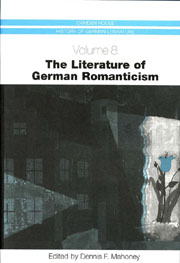Book contents
- Frontmatter
- Contents
- Illustrations
- Acknowledgments
- Abbreviations
- Introduction
- From “Romantick” To “Romantic”: The Genesis of German Romanticism in Late Eighteenth-Century Europe
- Goethe and the Romantic
- Early Romanticism
- From Goethe's Wilhelm Meister to anti-Meister Novels: The Romantic Novel between Tieck's William Lovell and Hoffmann's Kater Murr
- Tales of Wonder and Terror: Short Prose of the German Romantics
- The Romantic Drama: Tieck, Brentano, Arnim, Fouqué, and Eichendorff
- German Romantic Poetry in Theory and Practice: The Schlegel Brothers, Schelling, Tieck, Novalis, Eichendorff, Brentano, and Heine
- The Turn to History and the Volk: Brentano, Arnim, and the Grimm Brothers
- History and Moral Imperatives: The Contradictions of Political Romanticism
- Romanticism and Natural Science
- Gender Studies and Romanticism
- The Romantic Preoccupation with Musical Meaning
- Romanticism and the Visual Arts
- Goethe's Late Verse
- The Reception of German Romanticism in the Twentieth Century
- Works Cited
- Notes on the Contributors
- Index
Gender Studies and Romanticism
Published online by Cambridge University Press: 05 February 2013
- Frontmatter
- Contents
- Illustrations
- Acknowledgments
- Abbreviations
- Introduction
- From “Romantick” To “Romantic”: The Genesis of German Romanticism in Late Eighteenth-Century Europe
- Goethe and the Romantic
- Early Romanticism
- From Goethe's Wilhelm Meister to anti-Meister Novels: The Romantic Novel between Tieck's William Lovell and Hoffmann's Kater Murr
- Tales of Wonder and Terror: Short Prose of the German Romantics
- The Romantic Drama: Tieck, Brentano, Arnim, Fouqué, and Eichendorff
- German Romantic Poetry in Theory and Practice: The Schlegel Brothers, Schelling, Tieck, Novalis, Eichendorff, Brentano, and Heine
- The Turn to History and the Volk: Brentano, Arnim, and the Grimm Brothers
- History and Moral Imperatives: The Contradictions of Political Romanticism
- Romanticism and Natural Science
- Gender Studies and Romanticism
- The Romantic Preoccupation with Musical Meaning
- Romanticism and the Visual Arts
- Goethe's Late Verse
- The Reception of German Romanticism in the Twentieth Century
- Works Cited
- Notes on the Contributors
- Index
Summary
Historically, a pronounced gender bias toward male authors has skewed our critical understanding of German Romanticism. Standard workhorses like Frenzel's Daten deutscher Dichtung identify the “most important” Romantic writers as Achim von Arnim, Clemens Brentano, Joseph von Eichendorff, E. T. A. Hoffmann, Heinrich von Kleist, Novalis (Friedrich von Hardenberg), August Wilhelm Schlegel, Friedrich Schlegel, and Ludwig Tieck. Influential theoretical studies like Jochen Hörisch's Die fröhliche Wissenschaft der Poesie, Philippe Lacoue-Labarthe and Jean-Luc Nancy's The Literary Absolute, Manfred Frank's Einführung in die frühromantische Ästhetik, Winfried Menninghaus's Unendliche Verdopplung, Azade Seyhan's Representation and Its Discontents, and Ernst Behler's German Romantic Literary Theory likewise focus almost exclusively on male authors. As incisive as these analyses are in their articulations of Romantic theory, the theory they articulate clearly is androcentric. In these studies the female Romantics largely play the role of helpmeet to their male companions. For the most part, they are not treated as authors in their own right. And they often are referred to much too familiarly by their first names, an unreflected rhetorical gesture that implicitly suggests these women are not to be taken as seriously as their surnamed male counterparts. Read from a gender perspective, most scholarship on Romantic literary theory tacitly skips over Friedrich Schlegel's earliest prefigurations and formulations of Romantic criticism in terms of a theory of the feminine — his progressive essays “Ueber die weiblichen Charaktere in den griechischen Dichtern” (On the Feminine Characters in the Greek Poets, 1794), “Über die Diotima” (On Diotima, 1795), and “Über die Philosophie: An Dorothea” (On Philosophy: To Dorothea, 1799) — and reflects instead his markedly more conservative treatment of the feminine in the Gespräch über die Poesie (Conversation on Poesy, 1800).
- Type
- Chapter
- Information
- The Literature of German Romanticism , pp. 229 - 250Publisher: Boydell & BrewerPrint publication year: 2003

